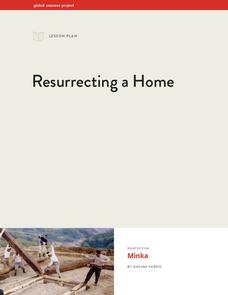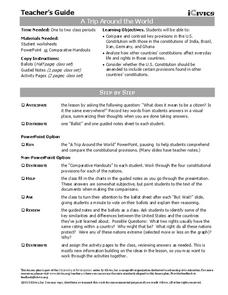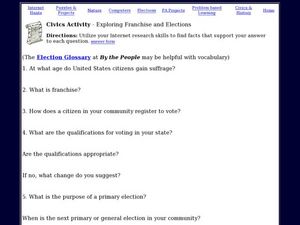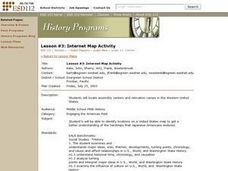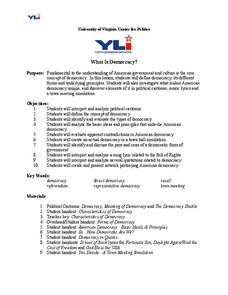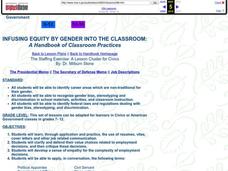PBS
Evolution of the Presidency: Theodore Roosevelt to Franklin D. Roosevelt
How much power should a president be allowed to exert? Theodore Roosevelt and Franklin D. Roosevelt exercised their power according to their interpretations of the United States Constitution, and these interpretations affected the...
Center for Civic Education
The Power of Nonviolence: The Children's March
What was the Children's Crusade and how did it impact the civil rights movement in the United States? Your young learners will learn about this incredible event through a variety of instructional activities, from reading a poem and...
Global Oneness Project
Resurrecting a Home
Davina Pardo's documentary Minka asks viewers to consider that value of preserving traditional dwellings and traditional building techniques by examining how American journalist John Roderick and Japanese architect Yoshihiro Takishita...
State Bar of Texas
Worcester v. Georgia
Can the president of the United States defy the rulings of the Supreme Court? Students investigate the case of Worcester v. Georgia and the impact it had on society and, most importantly, Native Americans. Using a short video clip as...
National Endowment for the Humanities
Revolution '67, Lesson 1: Protest: Why and How
To some people, protesting is as American as apple pie, but the factors that lead to protests can be as confusing to veteran activists as to today's youth. Revolution '67 explores the riots in Newark, New Jersey as a case study. ...
iCivics
For The President, All In A Day's Work
How does the president of the United States get the authority to exercise his/her duties? What responsibilities and tasks go into a hard day's work for the president? Here is a lesson plan that includes several instructional materials...
iCivics
Why Government?
Why do people create governments? Where did we get our ideas about government? This is a fantastic introductory lesson for your American government class that begins by reviewing the philosophies of Thomas Hobbes and John Locke in...
iCivics
Wanted: A Just Right Government
What type of government did American colonists gain and seek after gaining their independence after the Revolutionary War? Here is lesson plan that will guide your young learners through the new nation's progression from the Articles of...
iCivics
A Trip Around the World
How do the rights of citizens in other countries, such as India, Germany, Brazil, and Iran, compare to those of Americans? Take a closer look at the provisions of various foreign constitutions, and compare and contrast the protections...
Curated OER
The Role of the Judiciary in a System of Separation of Powers and Checks and Balances
Students determine the difference between the different branches of government and assess the role of each within the American governmental system.
Curated OER
The Role of the Judiciary in a System of Separation of Powers and Checks and Balances
High schoolers determine the role of each branch of government in a system of checks and balances. They demonstrate the role of the judiciary in American government
Rutgers University
How the Allies Won World War II: Island-hopping in the Central Pacific
Using primary source documents, young historians explore the strategies the US used to defeat Japan during WWII. They also learn about the American military experience, and innovations that changed the style of warfare. Young scholars...
Curated OER
Exploring Franchise and Elections
Students examine the American election process. In this elections lesson, students use Internet sources to respond to 13 questions about election terminology.
Curated OER
We the People
Students show how the meaning of the Preamble is reflected in current American culture. They collect images and/or sounds from media sources that represent, symbolize, or explain each phrase in the Preamble and create a media...
Curated OER
Comparing Ethnic Groups
Eleventh graders explore the relationship between the United States and the Native Americans from after the Civil War to the early 1900's. They evaluate the actions of the United States towards Native Americans and compare the actions to...
Curated OER
Lesson #3: Internet Map Activity
Students label assembly centers and relocation camps on a given map of the United States in order to create a better understanding of the relocation experience of Japanese-American citizens and the distance that families had to move and...
Curated OER
Growing a Citizen
Students analyze messages and values associated with civic engagement present in the media. They analyze the local community's promotion of values associated with civic engagement by conducting investigative research. They hypothesize...
Curated OER
Heroes
Students explore heroic characters. In this philanthropy lesson, students discuss the characteristics of a super hero and then define vocabulary associated with philanthropy such as civic virtue and altruism. Students work in groups to...
Curated OER
What is Democracy?
Students examine civic duties. In this citizenship lesson plan, students play an online game that requires them to consider the needs of their community. Students campaign for the issue they choose in the game.
Curated OER
Infusing Equity by Gender into the classroom
Students examine equality. In this civics lesson, students appoint committees for various offices then model a mock committee/application process in the classroom, followed by a discussion of whether equity was achieved or not and why.
Benjamin Franklin Tercentenary
Benjamin and the Way to A Good Life
Young scholars explore American history by reading biographical text in class. In this Benjamin Franklin lesson, students research the famous inventor by reading assigned text and answering reading comprehension questions afterwards....
Alabama Learning Exchange
Learning About Colonial Life
High schoolers use predictions to explore the lifestyle of American colonists. They draw conclusions about the culture of colonial America based on items used in daily life.
Curated OER
Examining the Declaration of Independence
Students examine the Declaration of Independence and its significance to American history. They read the document, identify America's grievances with Great Britain, and restate a part of the document in their own words.
Curated OER
Town Meeting with Class
Students discover civic responsibility and the purpose of town meetings. In this U.S. Government lesson, students investigate how the government is involved with almost every decision made in a city, no matter how big or small....
Other popular searches
- U.s. American Civics
- Us American Civics
- Chapter 1 American Civics
- Holt American Civics
- American Civics and Activism
- Chapter 2 American Civics
- Civics American Goverment


